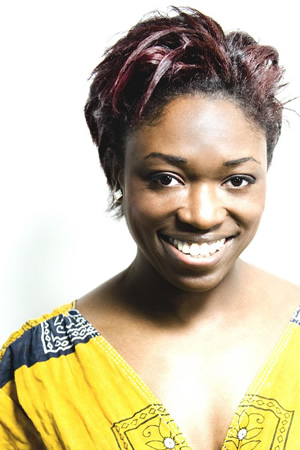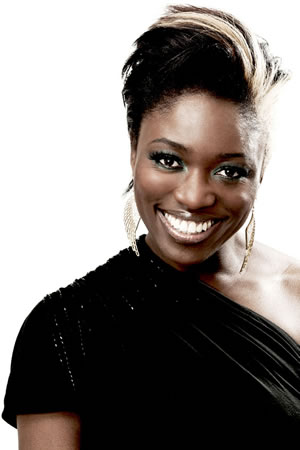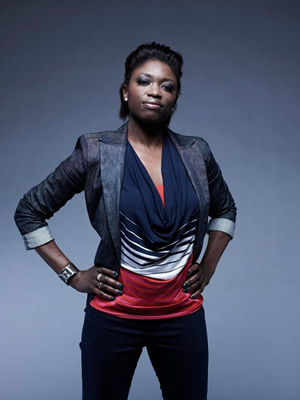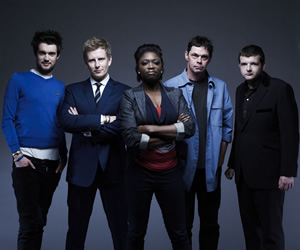
Circuit Training 22: Andi Osho

Circuit Training catches up with Andi Osho the day after one of the more bizarre incidents of the British comedy year, and "probably the funniest thing that's ever happened to me," she reckons. The London-born comic was compering the final of lady-based stand-up competition Funny Women when a full-on fight broke out in the crowd, necessitating the arrival of the fuzz. Order was eventually restored but, really, at the Funny Women final, who would have thought it?
Osho has seen a good few coppers in her time, but usually fake ones, due to her pre-comedy acting work. Waking the Dead, Casualty, EastEnders: you name it, she popped up in it. Those thespian skills proved to be a useful foundation for the future stand-up career, and she's quickly become a self-assured, increasingly in-demand fixture on both stage and screen. Her first nationwide tour kicks off early next year, and after regular slots on Tonightly and Stand Up For The Week she'll grace both Mock the Week and Michael McIntyre's Comedy Roadshow in the coming weeks.
Still, Osho admits that the right vehicle has yet to pull up, and she's refreshingly honest about her TV success to date. But we'll come to that. First of all, about that punch-up...
So the Funny Women show got a bit heated?
It was hilarious. It was this guy, him and this group of people just wouldn't shut up, and the people around them were starting to complain about them, then it all kicked off, the police were called and the next thing I know there's a man being dragged out. I'm on stage at the time, and I'm thinking 'What should I do, should I carry on?' 50 per cent of the audience weren't even looking at the stage, it was so ridiculous. People were very sweet to me afterwards saying "you handled that really well" and I'm thinking 'this is probably the funniest thing that's ever happened to me.'
You started off doing telly - but behind the scenes?
Yeah, I worked in post-production for ten years before going into stand-up, so I had a proper grown-up job and everything. I went to a design college and studied programme making, and the people that were much more applied ended up working in production companies and creating programmes. I was not very diligent so I ended up in the arse-end of it all in post-production.

At least with the arse-end you get the final say...
That's a nice way of putting it. It was alright, I got a job as a post-production supervisor on a soap called Night and Day, on ITV. We were all based in one place, the sets, the actors and everything, so I got to know a lot of people, a lot of the actors, and I thought 'I'd really love to do this.'
Acting must have seemed pretty doable after seeing the Night and Day rough-cuts.
Yeah, and it was good because even though it was editing, it really made a difference, being able to hit the ground running when I was on set, knowing how to behave, what to do, what the editor needs.
How did you go from that to stand-up?
I did a course. As an actor, you're really at the whim of the industry and it's not even about being good, it's about your face being right, having the right agent to get you in front of the right people - you can spend a lot of time being the wrong person in the wrong place. So I just wanted to have something that I was more in control of and stand-up was something that I'd always wanted to try, never had the guts to do it. Necessity and opportunity met and I signed up, thought I'd just see how it goes, did my first gig and loved it. I was tripping afterwards.
Did the acting help with the comedy?
Definitely. Because I was already comfortable being on stage, and just playing out characters, exaggerating the scenes, that came naturally.

You're a regular on Stand Up For The Week, and now you're guesting on Mock the Week - is that allowed?
I suppose Channel 4 would prefer that we didn't do Mock the Week while we're doing Stand Up For The Week, but, yeah, I'm not contracted to anybody.
Mock the Week doesn't suit every comic - how do you find it?
It's an interesting process. It really is a challenge to write your material in that short amount of time, and also when you get there it is very competitive, to get your material out. The way I see it, they encourage that competitiveness because that's what creates the vibe that makes it a funnier show, the fact that people really urgently want to get their stuff out. It can move on so quickly that you're kind of thinking 'Well, while we're talking about Cherie Blair I've got this blinding joke actually,' but you've got to get it in otherwise the conversation will have moved on to bread, or Wisconsin, and you'll be like 'How did that happen?'
And you know more than anyone how important the edit is...
Well that's it, and luckily sometimes it's all about the edit, you can have an average or worse show but they pick your best bits. You just have to make sure that you do enough contributions during the run of the show so they can do you justice.
Have you found your right place on TV yet?
Not for me, I feel like I'm still working in the boundaries of other people's formats, and that's fine. I'm still new, still finding my way and I think that's a good thing to do. You build up a rapport with the audience without having the responsibility of holding a whole show. Sometimes I think people see someone who goes immediately to getting their own show, they want it to fail almost, because it's happened too quickly in their eyes. And I'm still learning what I'm good at. So there's no rush to present Cash in the Attic.

Those people who want it to fail, do you mean industry people or the public?
I mean the general public, but maybe you're right, maybe the media and press as well. If someone comes from nowhere you've got nothing to attach it to, you can't tell whether they're any good or not. The British tendency is to go 'obviously they're shit.'
Especially for a black female comic, there'll be a suspicion about how you got a show so quickly.
This happens all the time, it'll happen because somebody's young or particularly old, or they're from a particular class or they're disabled, they're Australian or black or whatever - you'd be naive to think that people have gotten to where they are just on their merits as comedians. It happens because they've got something different to offer, which broadcasters or promoters think they can do something with, or will make the bill more interesting.
For example, Jack Whitehall is a good-looking upper class - not even middle class - young white guy and that was interesting to broadcasters and that's why he ended up doing Big Mouth and lots of other different shows. And the same with me, there's something about me that they've gone 'Oh well, that's different, we can do this, this, and this with that' and off you go. So I'm not gonna pretend that it hasn't contributed. But I hope that I deliver as well.
[i]For details of Andi's forthcoming tour Afroblighty - visit www.andiosho.co.uk
Help us publish more great content by becoming a BCG Supporter. You'll be backing our mission to champion, celebrate and promote British comedy in all its forms: past, present and future.
We understand times are tough, but if you believe in the power of laughter we'd be honoured to have you join us. Advertising doesn't cover our costs, so every single donation matters and is put to good use. Thank you.
Love comedy? Find out more